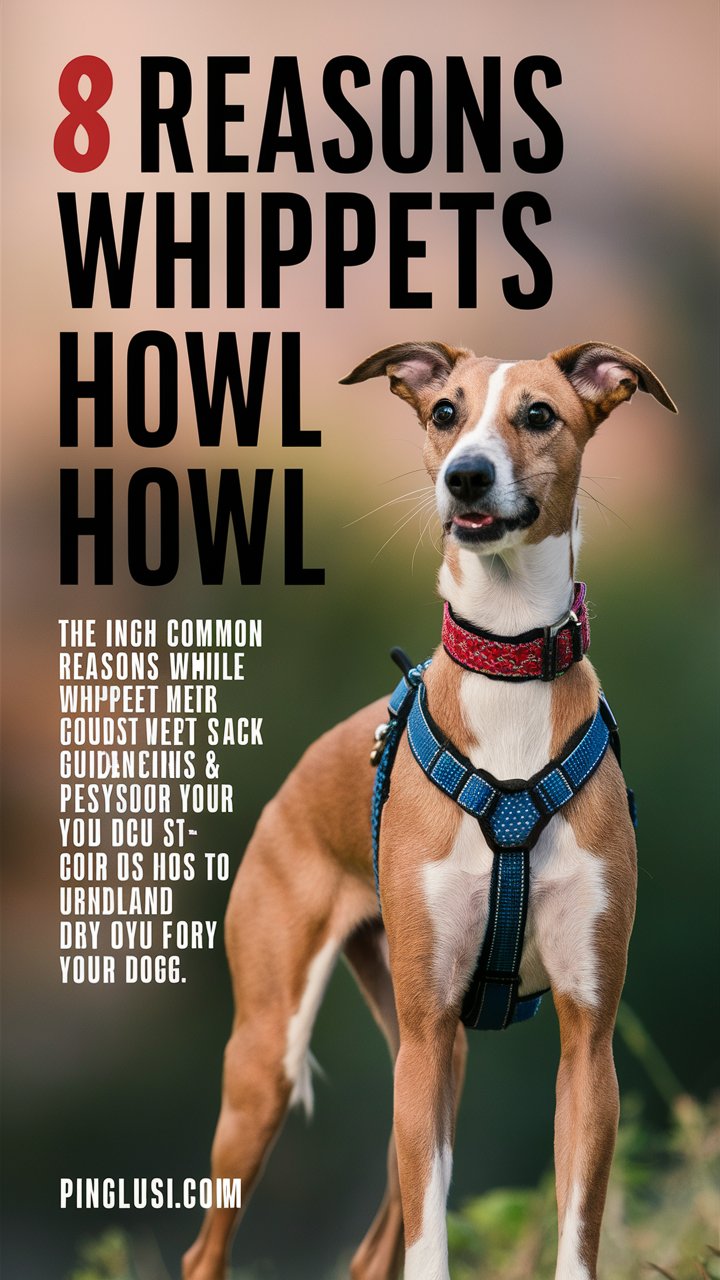Whippets are gentle, affectionate, and usually quiet companions. But if your whippet has suddenly started howling, you may find yourself confused—or even concerned. Unlike some other breeds, whippets aren’t known for being very vocal, which makes their occasional howling even more intriguing.
So, what exactly causes whippets to howl? And should you be worried?
In this article, you’ll discover:
✅ 10 real reasons why whippets howl (with science-backed insights)
✅ Advanced tips to reduce excessive howling without stressing your pup
✅ When howling is a normal behavior vs. when it’s a red flag
✅ Expert-level training strategies & lifestyle adjustments
Let’s dive in.
Top 10 Reasons Why Whippets Howl
1. Instinctive Communication (Wolf Heritage)
Howling is hardwired into dogs from their wolf ancestors. For wolves, it was a way to locate their pack and warn outsiders. Even though whippets are calm pets, their genetic instincts can surface—especially when they hear other dogs, sirens, or high-pitched sounds.
➡️ Weak point improved: Original article just said “instinct” but didn’t connect it to why it matters for whippet owners. Knowing this helps you understand it’s natural, not “bad behavior.”
2. Responding to Sounds Humans Can’t Hear
Dogs can detect frequencies up to 65,000 Hz (humans only hear up to 20,000 Hz). That means your whippet might be reacting to sounds like alarms, distant sirens, or even wildlife outside.
Tip: If your whippet howls at night, check for ultrasonic devices, pests, or neighborhood dogs.
3. Separation Anxiety
Whippets are deeply attached to their families. A sudden increase in howling when you leave could signal separation anxiety. Other signs include pacing, destructive chewing, or accidents in the house.
➡️ Pro Insight: Many owners miss the early signs of separation anxiety. Addressing it early with counter-conditioning and enrichment prevents it from escalating.
4. Attention-Seeking Behavior
Sometimes, howling is just your pup’s way of saying: “Hey, play with me!” Whippets are intelligent and get bored easily. If ignored, boredom can turn into vocalization.
5. Imitating You (Or “Group Singing”)
If you sing, whistle, or even play an instrument, your whippet may join in. It’s their way of bonding—similar to wolves howling together.
6. Learned Behavior (Accidental Encouragement)
If you’ve laughed, petted, or given treats after your dog howled, you may have unintentionally reinforced it. Dogs repeat what gets them attention.
7. Location Signaling (Guiding the Pack)
When you come home, or when they’re in a new place, your whippet might howl to let you know where they are—or to alert others that they’re entering a space peacefully.
8. Anxiety or Stress Triggers
Moving homes, schedule changes, or the loss of a family member can trigger stress howling. Whippets are emotionally sensitive dogs and may express distress vocally.
9. Excitement Overload
Sometimes, it’s pure joy. Trips to the park, car rides, or seeing you after hours may make them burst into howls.
10. Medical Causes (Often Overlooked)
This is where most articles stop short—but it’s crucial. Howling can sometimes signal pain, cognitive decline (in older dogs), or ear issues.
➡️ Pro Tip: If your whippet’s howling is new, persistent, or accompanied by unusual behavior (limping, restlessness, loss of appetite), consult a vet immediately.
How to Reduce Excessive Whippet Howling: 5 Expert Tips
1. Train the ‘Quiet’ Command (Advanced Method)
Use positive reinforcement to teach “quiet.” Instead of just waiting, pair it with clicker training for faster results.
2. Enrichment Over Boredom
Provide puzzle feeders, snuffle mats, or flirt poles. A tired whippet is a quiet whippet.
3. Make Departures Routine & Calm
Don’t create drama when leaving or returning. Keep it neutral so they don’t link your absence with stress.
4. Ignore Attention-Seeking Howls
Reward silence—not noise. Consistency is key here.
5. Professional Guidance (Last Resort)
If anxiety is deep-rooted, consult a certified canine behaviorist. They can design a personalized plan.
When to Worry About Whippet Howling
- Sudden onset with no clear trigger
- Excessive howling at night
- Paired with other symptoms (restlessness, limping, changes in appetite)
- Signs of separation anxiety disorder
FAQs
Q: Are whippets naturally quiet dogs?
Yes, whippets are among the quieter breeds. Frequent howling usually means there’s an underlying trigger.
Q: Should I howl back at my whippet?
It’s cute, but doing it often may reinforce the behavior. Use sparingly if you don’t want it to become a habit.
Q: Can crate training reduce howling?
Yes, but only if the crate is introduced positively. Otherwise, it may increase stress.
Final Thoughts
Whippets may not howl often, but when they do, it’s worth paying attention. Sometimes it’s playful, sometimes it’s instinct—but occasionally, it’s a sign of stress or health concerns.
By understanding the real reasons behind your whippet’s howling and applying expert-backed solutions, you’ll not only reduce unwanted noise but also strengthen your bond with your pup.
